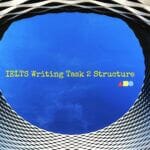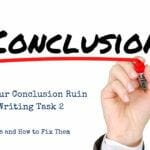Introduction – The Importance of Clear and Concise Writing in IELTS Task 2
The International English Language Testing System (IELTS) is a widely recognized and respected assessment of English language proficiency, with millions of test-takers each year aiming to achieve their desired scores. In the IELTS Writing Task 2, candidates are required to write an essay in response to a given statement or question, showcasing their ability to express ideas clearly and effectively.
A key factor that greatly influences a candidate’s score in the IELTS Writing Task 2 is the quality of their writing, specifically, the clarity and conciseness of their expression. Examiners look for well-structured, coherent, and easily understandable essays that demonstrate the test-taker’s command of the English language. Clear and concise writing not only enhances the overall readability of your essay but also ensures that your main ideas and arguments are effectively communicated, increasing the likelihood of a higher score.
In this blog post, we will delve into the principles of clear and concise writing, offer practical tips and strategies, and provide examples to help you elevate your IELTS Writing Task 2 performance. By mastering the art of writing clearly and concisely, you will be well-equipped to impress the examiners and achieve the IELTS score you desire.
Understanding Clear and Concise Writing
Before diving into specific techniques for improving your writing, it’s crucial to understand what clear and concise writing entails.
Clear writing is easy to understand, with ideas presented in a logical order and expressed using appropriate vocabulary. It is coherent, meaning that the sentences flow smoothly from one to another, maintaining a consistent tone and style throughout the essay. By writing clearly, you ensure that the examiner can quickly grasp your main points and follow your line of reasoning.
Concise writing, on the other hand, involves expressing ideas in the most efficient way possible, without unnecessary words or redundancies. A concise essay delivers the core message without any distractions, making it more impactful and persuasive.
The benefits of writing clearly and concisely in the IELTS Writing Task 2 include:
- Readability: Clear and concise writing is easier for the examiner to read and comprehend. As a result, your essay becomes more accessible and enjoyable to read, making a positive impression on the examiner.
- Coherence: Writing clearly and concisely contributes to the coherence of your essay. By organizing your ideas logically and maintaining a consistent tone, you create a seamless flow of information that enables the examiner to understand your arguments and follow your train of thought.
- Word count: In IELTS Writing Task 2, you need to write at least 250 words, but excessive wordiness can make your essay difficult to read and dilute your main points. By writing concisely, you can effectively convey your message without exceeding the recommended word count, demonstrating your ability to express ideas efficiently.
In the following sections, we will explore practical tips and strategies to enhance your writing, helping you achieve clear and concise expression in your IELTS Writing Task 2 essays.
Tips for Writing Clearly
Achieving clear writing in your IELTS Writing Task 2 essay is essential for communicating your ideas effectively and making a positive impression on the examiner. Here are some practical tips to help you write more clearly:
- Use simple sentences: While it’s important to demonstrate your grammatical range, overly complex sentences can confuse the reader and obscure your meaning. Aim to use a mix of simple, compound, and complex sentences to convey your ideas clearly and effectively.
- Avoid jargon and technical terms: Unless the essay topic requires specific technical language, try to avoid jargon and use everyday vocabulary instead. By using language that is easily understood by a wide audience, you ensure that your message is accessible to the examiner.
- Use appropriate vocabulary: Expand your vocabulary by learning synonyms and topic-specific terms, but make sure to use them correctly and in the appropriate context. Misused words can confuse the reader and detract from your overall clarity.
- Be specific: Provide concrete examples and details to support your arguments. Vague or generalized statements can make your essay unclear and unconvincing.
- Maintain a consistent tone and style: Write in a formal, academic style, and avoid using contractions, slang, or overly casual language. Consistency in tone and style helps maintain the coherence and professionalism of your essay.
- Organize your ideas logically: Use clear and concise topic sentences to introduce each paragraph, and arrange your ideas in a logical order. Use transition words and phrases to connect your ideas and guide the reader through your essay.
By incorporating these tips into your writing, you can create an essay that is clear, coherent, and easy to understand, greatly improving your chances of achieving a high score in the IELTS Writing Task 2.
Tips for Writing Concisely
Writing concisely is an essential skill for IELTS Writing Task 2, as it enables you to express your ideas efficiently without exceeding the recommended word count.
Here are some strategies to help you write more concisely:
- Remove redundancy: Eliminate repetitive or unnecessary words, phrases, or information from your essay. Focus on the essential elements of your argument and ensure that every word contributes to your overall message.
- Use strong verbs: Replace weak or passive verbs with more powerful, active alternatives. Strong verbs convey your ideas more effectively and can often replace longer phrases, reducing your word count.
Example:
Weak: “The government is responsible for the implementation of environmental regulations.”
Strong: “The government implements environmental regulations.” - Eliminate filler words: Remove words or phrases that do not add value or meaning to your sentences. Filler words, such as “basically,” “actually,” or “in order to,” can make your writing seem wordy and less precise.
- Combine ideas when appropriate: Instead of writing multiple short sentences, consider combining related ideas into a single, coherent sentence. This can make your writing more concise and easier to follow.
Example:
Short sentences: “Air pollution is a major problem. It causes health issues. It also harms the environment.”
Combined sentence: “Air pollution is a major problem, causing both health issues and environmental damage.” - Be mindful of wordiness: Avoid using unnecessary phrases or words that make your sentences longer without adding value. For example, replace “due to the fact that” with “because” or “in the event that” with “if.”
- Edit and revise: Once you have completed your essay, carefully review your writing and remove any unnecessary or repetitive information. Editing and revising your work is crucial for ensuring that your essay is concise and clearly communicates your ideas.
By incorporating these strategies into your writing, you can create a concise and impactful essay that effectively conveys your ideas within the required word count, setting you up for success in the IELTS Writing Task 2.
Enhancing Your Writing with Clear and Concise Examples
To illustrate the impact of clear and concise writing on IELTS Writing Task 2 essays, let’s examine sample prompts and responses, highlighting the improvements made through clear and concise writing.
Prompt: Some people believe that the government should provide financial assistance to all artists, including painters, musicians, and poets. Others believe that this money could be better spent elsewhere. Discuss both views and give your own opinion.
Unclear and wordy response: Artists, which may include painters, musicians, and poets, are sometimes in need of financial support from the government in order to continue their creative work, while there are individuals who think that the resources that could potentially be allocated to the aforementioned artists might be more effectively used for other purposes that are potentially more important in the grand scheme of things.
Clear and concise response: Some people argue that the government should financially support all artists, while others believe that these funds could be better spent elsewhere.
In this example, the unclear and wordy response contains excessive information and redundant phrases that obscure the main point. By removing unnecessary details and using concise language, the clear and concise response effectively communicates the central idea.
Prompt: Some people think that parents should teach their children about money matters. Others believe that this is the responsibility of schools. Discuss both views and give your opinion.
Unclear and wordy response: Teaching children about the various aspects of managing money and financial matters is considered by some people to be a task that should fall under the responsibility of parents, while other individuals have the belief that it is the schools that ought to be in charge of providing education on these topics.
Clear and concise response: Some people believe that parents should teach their children about money matters, while others think that schools should be responsible for this education.
The unclear and wordy response uses convoluted language and excessive phrasing, making it difficult to understand the main point. The clear and concise response simplifies the sentence structure and removes redundant information, resulting in a clearer and more effective statement.
By applying the principles of clear and concise writing to your IELTS Writing Task 2 essays, you can create well-organized, coherent, and impactful responses that will impress the examiner and increase your chances of achieving a higher score.
Common Pitfalls to Avoid
In your quest for clear and concise writing in IELTS Writing Task 2, it’s essential to be aware of common mistakes that can lead to unclear or wordy writing. By recognizing these pitfalls, you can take steps to prevent them and improve the quality of your essays.
Here are some common mistakes to avoid:
- Overuse of passive voice: Passive voice can make your writing less direct and harder to understand. While it is not always incorrect to use passive voice, it’s generally better to use active voice whenever possible.
Example:
Passive: “It is believed by many people that climate change is a serious issue.”
Active: “Many people believe that climate change is a serious issue.” - Excessive use of jargon and complex vocabulary: While it’s important to demonstrate a wide range of vocabulary in your essay, using overly complex words or jargon can make your writing unclear. Aim to use vocabulary that is appropriate for the topic and clearly conveys your ideas.
- Long and convoluted sentences: Overly long sentences can be challenging to follow and may obscure your main points. Break down complex ideas into shorter, more straightforward sentences to improve clarity and readability.
- Redundancy and repetition: Repeating ideas or using multiple words to express the same concept can make your writing wordy and less effective. Eliminate redundancy and focus on presenting each idea once, using concise language.
- Lack of focus or organization: If your essay lacks a clear structure or deviates from the main topic, it can be difficult for the reader to follow your argument. Ensure that your essay is well-organized and directly addresses the given prompt.
- Insufficient editing and proofreading: Failing to thoroughly review your work can result in unclear or wordy writing. Always take the time to edit and proofread your essay, removing any unnecessary or repetitive information and ensuring that your ideas are clearly and concisely presented.
By avoiding these common pitfalls, you can improve the clarity and conciseness of your IELTS Writing Task 2 essays, enhancing your chances of achieving a higher score.
Practice Makes Perfect: Developing Your Clear and Concise Writing Skills
To truly master clear and concise writing in IELTS Writing Task 2, consistent practice is key. By regularly working on your writing skills and applying the strategies discussed in this blog post, you can gradually refine your ability to communicate your ideas effectively and concisely.
Here are some tips to help you develop your clear and concise writing skills:
- Read widely: Reading high-quality academic articles, newspapers, and essays can help you become familiar with clear and concise writing styles. Pay attention to how authors present their ideas, the vocabulary they use, and the structure of their sentences.
- Write regularly: Dedicate time to practice writing essays in response to IELTS Writing Task 2 prompts. This will help you become more comfortable with the format and allow you to apply the clear and concise writing strategies discussed in this post.
- Seek feedback: Share your essays with teachers, classmates, or friends who can provide constructive feedback on your writing. This can help you identify areas for improvement and gain insights into how to make your writing clearer and more concise.
- Reflect on your writing: After completing an essay, take the time to review and analyze your work. Identify areas where you can apply the strategies discussed in this blog post to improve the clarity and conciseness of your writing.
- Use online resources: Numerous websites, forums, and online courses focus on IELTS preparation and improving writing skills. Take advantage of these resources to enhance your understanding of clear and concise writing.
- Set realistic goals: As with any skill, improving your writing takes time and effort. Set achievable goals for your writing practice, and track your progress over time.
- Experiment with different writing styles: Trying out various writing styles can help you find the one that best suits your needs and allows you to express your ideas clearly and concisely. Don’t be afraid to experiment with different approaches to find what works best for you.
By dedicating time and effort to practice and develop your clear and concise writing skills, you will be better prepared to excel in IELTS Writing Task 2 and achieve the score you desire.
A Few More Examples
In this section, we will present several examples of unclear and wordy sentences from IELTS Writing Task 2 essays, followed by their improved, clear, and concise versions. These examples will help you understand how to apply the principles of clear and concise writing to your own essays.
Example 1:
Unclear and wordy: There are a large number of individuals who think that it is of paramount importance for young children to be educated about the significance of maintaining a healthy diet and partaking in regular physical activities in order to prevent the prevalence of obesity in society.
Clear and concise: Many people believe that teaching children about a healthy diet and regular exercise is crucial to combat obesity in society.
Example 2:
Unclear and wordy: The undeniable fact is that the excessive utilization of natural resources by human beings has led to a situation where there is a considerable depletion of these resources, which has a detrimental impact on the environment.
Clear and concise: Excessive human consumption of natural resources leads to their depletion and harms the environment.
Example 3:
Unclear and wordy: In the contemporary world that we inhabit, it is observed that an immense number of individuals are relocating to urban areas with the primary objective of seeking better employment opportunities and an enhanced standard of living.
Clear and concise: Today, many people move to cities for better job opportunities and an improved quality of life.
Example 4:
Unclear and wordy: The implementation of stringent regulations by governmental authorities is of vital importance when it comes to reducing the emission of harmful greenhouse gases, which are the primary contributors to the phenomenon of climate change.
Clear and concise: Strict government regulations are essential to reduce greenhouse gas emissions and combat climate change.
Example 5:
Unclear and wordy: It is a widely held belief that the advancement of technology has had a profoundly transformative effect on the way human beings communicate with one another, resulting in the emergence of numerous innovative means of communication that were previously unimaginable.
Clear and concise: Technological advancements have revolutionized human communication, leading to many innovative methods that were once unimaginable.
Example 6:
Unclear and wordy: There is a considerable percentage of the population that firmly believes that the most effective approach to tackling the issue of climate change is by creating awareness among people about the importance of adopting eco-friendly practices in their daily lives.
Clear and concise: Many people believe that raising awareness about eco-friendly practices is key to addressing climate change.
Example 7:
Unclear and wordy: It is becoming increasingly apparent that the continuous expansion of industrialization and urbanization across the globe has resulted in the destruction of the natural habitats of various species, thereby leading to the endangerment of numerous plants and animals.
Clear and concise: Global industrialization and urbanization contribute to habitat destruction, endangering countless plant and animal species.
Example 8:
Unclear and wordy: One of the most significant drawbacks associated with the extensive use of social media platforms by young people is the potential for them to be exposed to inappropriate or harmful content, which may have negative implications for their mental well-being.
Clear and concise: Excessive social media use by young people can expose them to harmful content, negatively impacting their mental well-being.
Example 9:
Unclear and wordy: The majority of experts in the field of education are of the opinion that the incorporation of technology into the learning process can have a tremendously positive impact on the overall academic performance of students.
Clear and concise:
Most education experts agree that integrating technology into learning can greatly improve students’ academic performance.
Example 10:
Unclear and wordy: There exists a prevalent notion among numerous people that a considerable amount of time and effort should be devoted to the conservation of historical monuments and buildings, as these structures serve as an invaluable testament to the rich cultural heritage of a nation.
Clear and concise: Many people believe that preserving historical monuments and buildings is essential to honor a nation’s rich cultural heritage.
Example 11:
Unclear and wordy: A great deal of research has been conducted on the subject of the impact of advertisements on consumer behavior, and it has been concluded that the persuasive techniques employed by advertisers have the potential to significantly influence the purchasing decisions of consumers.
Clear and concise: Research shows that persuasive advertising techniques can significantly affect consumer purchasing decisions.
Example 12:
Unclear and wordy: The extensive availability of fast-food restaurants, coupled with the hectic pace of modern life, has made it considerably more challenging for individuals to adhere to a nutritious and balanced diet, which is essential for maintaining optimal health.
Clear and concise: The prevalence of fast-food restaurants and a busy lifestyle make it harder for people to maintain a healthy, balanced diet.
Example 13:
Unclear and wordy: There is a growing consensus among scientists and researchers that the widespread use of renewable energy sources, such as solar and wind power, could play a pivotal role in reducing humanity’s dependence on non-renewable fossil fuels.
Clear and concise: Scientists agree that using renewable energy sources, like solar and wind power, can reduce our reliance on fossil fuels.
Example 14:
Unclear and wordy: It has been observed that a substantial proportion of young individuals are increasingly opting for a gap year prior to commencing their university education, with the intention of gaining invaluable life experiences and developing essential skills.
Clear and concise: Many young people choose a gap year before starting university to gain life experiences and develop important skills.
Example 15:
Unclear and wordy: The detrimental effects of air pollution on human health, particularly in densely populated urban areas, have become an issue of great concern for governmental authorities, necessitating the implementation of effective measures to mitigate this problem.
Clear and concise: The harmful effects of air pollution on human health in urban areas require governments to take effective measures to address the issue.
By examining these examples, you can see the importance of writing clearly and concisely to convey your ideas effectively. Implementing these strategies in your IELTS Writing Task 2 essays will help you achieve a higher score and demonstrate your ability to communicate in an academic setting.
Conclusion: The Lasting Impact of Clear and Concise Writing on Your IELTS Success
In conclusion, clear and concise writing is crucial for achieving success in IELTS Writing Task 2. By mastering the art of communicating your ideas effectively and efficiently, you will not only impress examiners with your well-structured, coherent, and persuasive arguments but also ensure that you stay within the word limit and make the best use of your time during the exam.
To improve your clear and concise writing skills, remember to apply the strategies discussed in this blog post, including writing clearly with simple sentences and appropriate vocabulary, and writing concisely by removing redundancy, using strong verbs, and eliminating filler words. Be mindful of common pitfalls and learn from the examples provided to enhance your writing further.
Lastly, the importance of consistent practice cannot be overstated. By dedicating time and effort to hone your clear and concise writing skills, seeking feedback, and reflecting on your progress, you will be better prepared to excel in IELTS Writing Task 2 and achieve the score you need for your academic and professional goals.
Now that you understand the importance of clear and concise writing in IELTS Writing Task 2 and have the necessary tools and strategies at your disposal, it’s time to put them into practice. Good luck on your IELTS journey and remember – practice makes perfect!





0 Comments